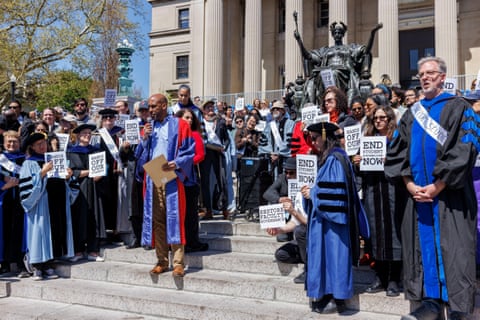
He accepted that the partys version of the IHRA definition, incorporated into its code of conduct by the national executive, was not accepted by most of the Jewish community, including many Labour supporters.
Labour has adopted the full definition, but reworded a handful of the 11 associated examples, principally one connected to criticism of Israel.
The change was needed, Corbyn wrote, as this one example has sometimes been used by those wanting to restrict criticism of Israel that is not antisemitic.
He added: But I feel confident that this outstanding issue can be resolved through dialogue with community organisations, including the Jewish Labour Movement, during this months consultation.
There was limited reaction from Jewish groups, with some privately expressing annoyance they had not been briefed in advance about an article released shortly before the start of the sabbath.
Gideon Falter, the chairman of Campaign Against Antisemitism, dismissed what he called a vague and meaningless article. He said that Corbyn had again preached to Jews that he is right to have rewritten the international definition of antisemitism and was not taking on board the concerns of the Jewish community.
However, the shadow Treasury minister Lyn Brown tweeted that the article was the words of the man I know. She added: Jewish people who are feeling concerned must be listened to.
As well as the issues over the definition of antisemitism, Corbyn must find a solution to the situation concerning Hodge and the Dudley North MP, Ian Austin, who face disciplinary charges after dissenting over antisemitism policy in ways the party claims were abusive.
Letters released in a series of tweets by Hodge show her lawyers, Mishcon de Reya, repeatedly asking for further details of the alleged offence and information about any witnesses to the confrontation in the House of Commons on 17 July.
While the Labour party general secretary, Jennie Formby, gives no details, Hodges lawyers call the investigation simply untenable and argue it should be dropped immediately.
One letter from Formby, dated 25 July, notifies the lawyers that the investigation could end on condition that your client gives in short order an appropriate apology for her conduct.
In an emailed reply the same day, Mishcon de Reya rejects this, saying: For our client to be forced into an apology, this would mean that you would have predetermined that she has done something wrong.
A further letter from Formby says this would not be the case: As a matter of law an apology is not generally an admission of guilt or liability. So inviting an apology from your client is neither an accusation of guilt nor evidence of predetermination. This argument is then dismissed by Hodges lawyers as simply bizarre.
It is understood that Austin is also waiting to learn details of accusations against him, with his lawyers having written to Formby but receiving no reply as yet.



